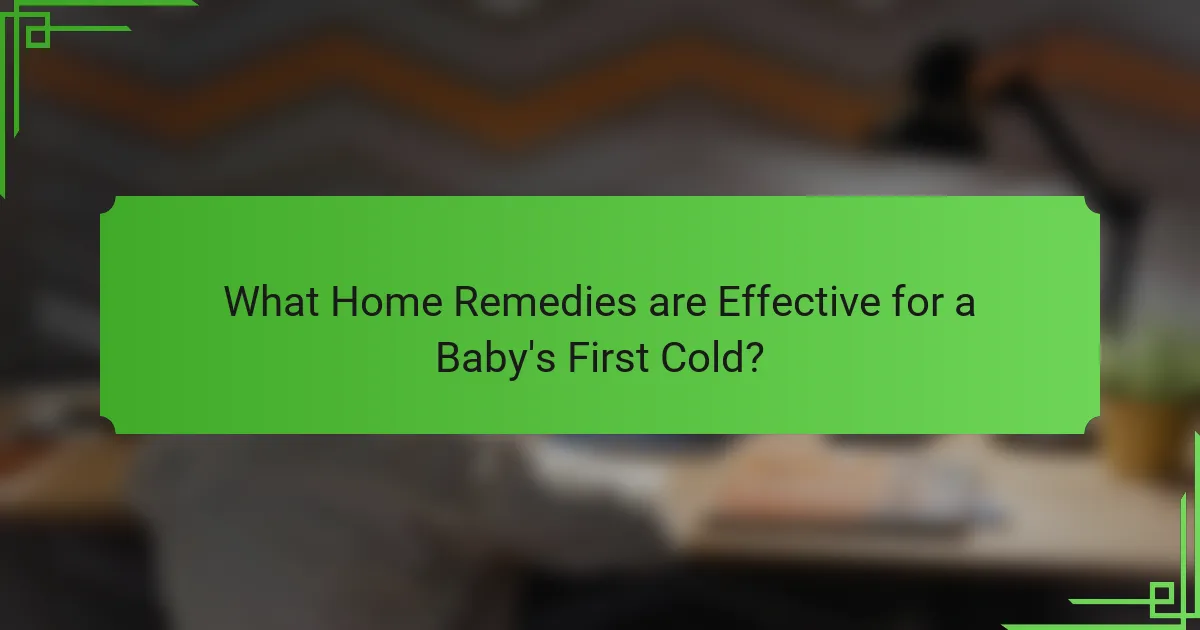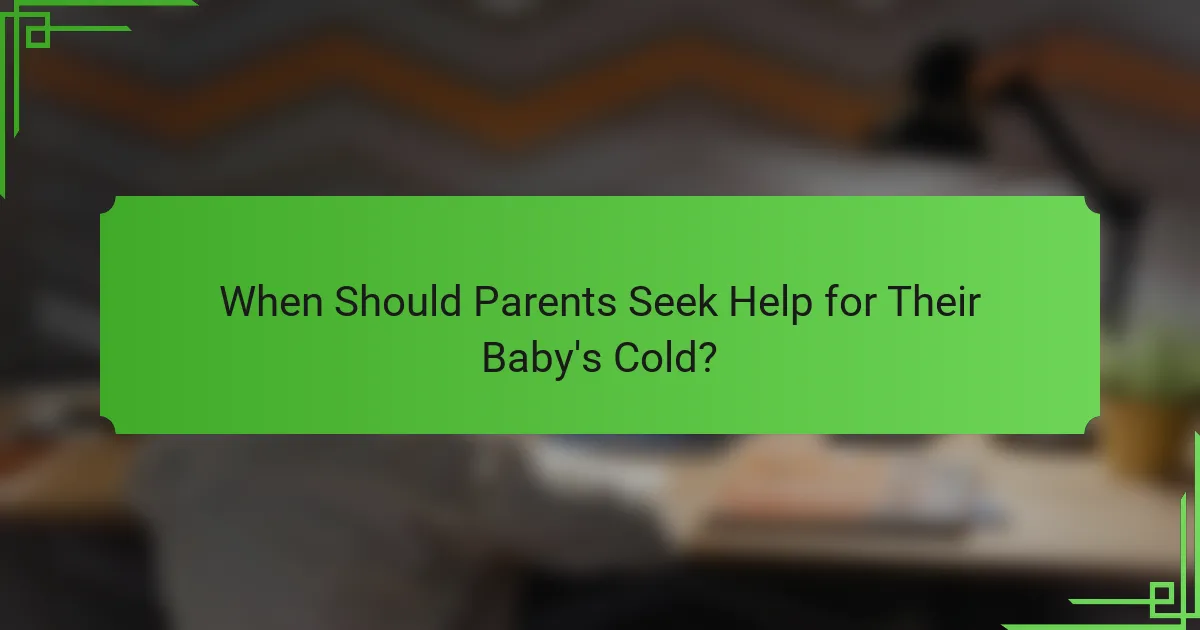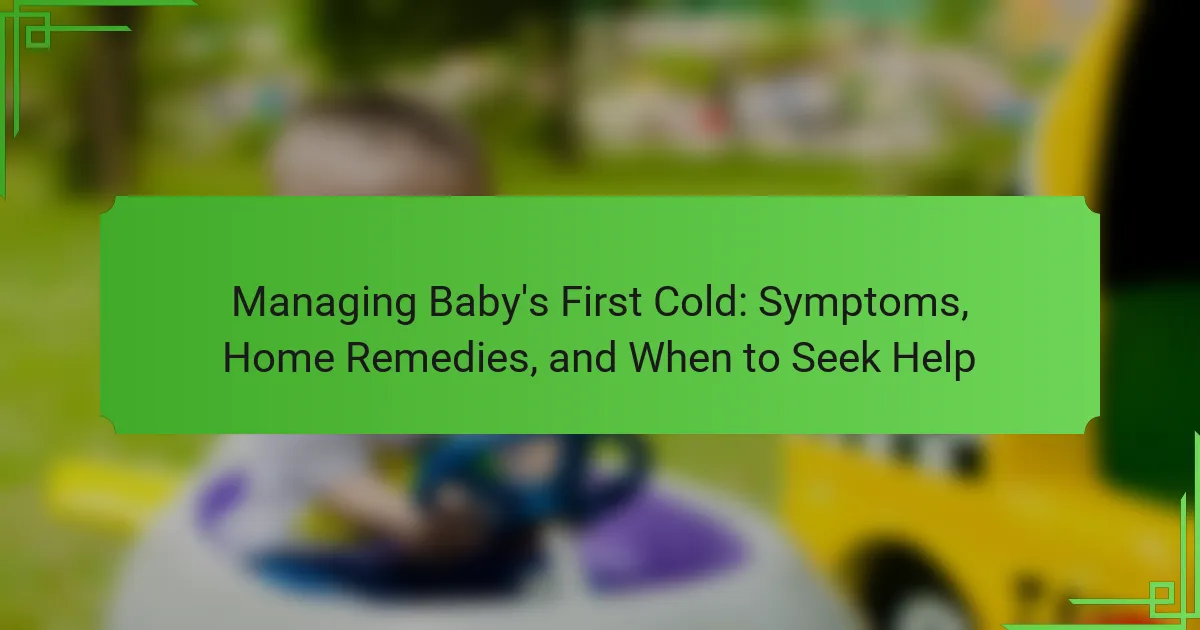A baby’s first cold is a common viral infection that typically arises from exposure to respiratory viruses, particularly affecting infants under six months due to their developing immune systems. Symptoms include a runny nose, cough, and mild fever, which usually resolve within a week. Effective home remedies for alleviating these symptoms include saline nasal drops, humidifiers, gentle steam inhalation, and warm baths. Parents should monitor their baby’s condition closely and seek medical attention if symptoms worsen, especially if the baby is under three months old, has a high fever, or exhibits signs of dehydration or lethargy. This article provides essential information on managing a baby’s first cold, including symptom recognition, home remedy options, and guidelines for when to consult a healthcare professional.

What is a Baby’s First Cold?
A baby’s first cold is a common viral infection affecting infants. It typically occurs when a baby is exposed to respiratory viruses. Symptoms may include a runny nose, cough, and mild fever. Babies under six months are particularly susceptible. This is due to their developing immune systems. Most infants experience mild symptoms that resolve within a week. According to the American Academy of Pediatrics, colds in babies are usually not serious. However, parents should monitor for worsening symptoms.
How can parents recognize the signs of a baby’s first cold?
Parents can recognize the signs of a baby’s first cold through specific symptoms. Common indicators include a runny or stuffy nose. Babies may also exhibit sneezing and coughing. A mild fever can occur, typically below 101°F. Changes in feeding patterns may be noticeable. Babies may be fussier than usual and show signs of tiredness. These symptoms usually develop gradually. According to the American Academy of Pediatrics, colds are common in infants and often resolve within a week.
What are the common symptoms associated with a baby’s first cold?
Common symptoms associated with a baby’s first cold include a runny nose, sneezing, and coughing. Babies may also experience a mild fever, irritability, and difficulty sleeping. These symptoms typically appear 1 to 3 days after exposure to the virus. The average duration of cold symptoms in infants is about 7 to 10 days. According to the American Academy of Pediatrics, these symptoms are normal and usually resolve without medical intervention.
How do symptoms of a cold differ from other illnesses in babies?
Symptoms of a cold in babies typically include a runny or stuffy nose, sneezing, and a mild cough. These symptoms are generally mild and resolve within a week. In contrast, other illnesses such as influenza may present with high fever, severe fatigue, and body aches. Additionally, bacterial infections can lead to symptoms like high fever, persistent cough, or difficulty breathing. According to the Centers for Disease Control and Prevention (CDC), colds are usually less severe than these other illnesses. Recognizing these differences can help caregivers determine when to seek medical advice.
Why is it important to manage a baby’s first cold effectively?
Managing a baby’s first cold effectively is crucial to ensure their comfort and health. Babies have underdeveloped immune systems, making them more vulnerable to complications. Effective management helps alleviate symptoms like congestion and irritability. It also prevents the cold from worsening into more severe illnesses, such as bronchitis or pneumonia. According to the American Academy of Pediatrics, proper care can reduce the risk of dehydration, which is a significant concern in infants with colds. Additionally, managing symptoms can promote better sleep, aiding recovery. Overall, effective management supports the baby’s overall well-being and aids in a quicker return to normal health.
What are the potential complications of an untreated cold in infants?
Potential complications of an untreated cold in infants include ear infections, sinusitis, and pneumonia. Ear infections can occur due to fluid buildup in the middle ear, affecting hearing and causing pain. Sinusitis may develop when nasal passages become blocked, leading to inflammation and infection. Pneumonia is a more severe complication where the lungs become infected, potentially resulting in difficulty breathing and hospitalization. Infants are particularly vulnerable due to their developing immune systems. According to the American Academy of Pediatrics, these complications can arise if symptoms persist or worsen.
How can managing a cold early benefit the baby’s overall health?
Managing a cold early can significantly benefit a baby’s overall health. Early intervention can prevent the cold from worsening, reducing the risk of complications such as ear infections or bronchitis. Prompt management helps maintain the baby’s comfort and hydration levels. It can also shorten the duration of symptoms, allowing for quicker recovery. Research shows that babies who receive timely care experience fewer severe symptoms. This proactive approach supports the immune system in effectively fighting off the virus. Overall, early management promotes better health outcomes for infants during respiratory illnesses.

What Home Remedies are Effective for a Baby’s First Cold?
Home remedies effective for a baby’s first cold include saline nasal drops and a humidifier. Saline nasal drops help to clear nasal congestion. They can be safely used for infants and are effective in easing breathing. A humidifier adds moisture to the air, which can soothe irritated airways. This can also help reduce coughing and nasal congestion. Additionally, gentle steam inhalation can provide relief for a stuffy nose. Warm baths can also help by relaxing the baby and easing discomfort. These remedies are commonly recommended by pediatricians for managing cold symptoms in infants.
How can parents soothe their baby’s symptoms at home?
Parents can soothe their baby’s symptoms at home by using several effective methods. Keeping the baby hydrated is crucial. Offer breast milk or formula frequently. Using a humidifier can help ease congestion. Warm baths may also provide comfort and relief. Gently rubbing the baby’s back can soothe discomfort. Elevating the baby’s head during sleep can improve breathing. For fever, administer age-appropriate doses of acetaminophen or ibuprofen, as recommended by a pediatrician. These methods are supported by pediatric guidelines for managing mild cold symptoms in infants.
What natural remedies are safe for infants with a cold?
Saline nasal drops are safe for infants with a cold. They help clear nasal congestion. Humidifiers can also provide moisture to the air, easing breathing. Breastfeeding offers hydration and immune support. Warm baths can soothe and relax infants. Honey is not recommended for infants under one year. Always consult a pediatrician before trying new remedies.
How can hydration and nutrition support recovery from a cold?
Hydration and nutrition are crucial for recovery from a cold. Adequate fluid intake helps thin mucus, making it easier to expel. Staying hydrated also prevents dehydration, which can worsen symptoms. Nutrition provides essential vitamins and minerals that support the immune system. Foods rich in vitamin C, like citrus fruits, can enhance immune response. Zinc, found in nuts and seeds, also plays a role in reducing cold duration. A balanced diet promotes overall health, aiding the body’s ability to fight infections. Studies show that proper hydration and nutrition can significantly improve recovery times from respiratory infections.
What precautions should be taken when using home remedies?
When using home remedies, ensure safety and effectiveness. Always consult a healthcare professional before trying remedies, especially for infants. Check for potential allergies to ingredients used in home remedies. Use remedies in moderation to avoid adverse effects. Monitor the baby’s response closely after administering any remedy. Discontinue use immediately if any negative symptoms arise. Avoid remedies that lack scientific backing or proven efficacy. Lastly, keep all home remedy ingredients out of reach of children to prevent accidental ingestion.
Are there any home remedies that should be avoided for infants?
Yes, certain home remedies should be avoided for infants. Honey is one such remedy, as it can cause botulism in babies under one year old. Additionally, essential oils can be harmful due to their concentrated nature. Over-the-counter medications for adults should never be given to infants. Herbal teas may not be safe due to unknown effects on infants. Aspirin should be strictly avoided, as it can lead to Reye’s syndrome. Always consult a pediatrician before trying any home remedy for infants.
How can parents ensure the safety of natural treatments?
Parents can ensure the safety of natural treatments by consulting healthcare professionals. This includes pediatricians or certified herbalists who understand children’s health. Parents should research the ingredients in natural treatments. They must verify that these ingredients are safe for babies. Parents should also check for any potential allergies. Monitoring for adverse reactions after administering treatments is essential. Keeping a record of symptoms and treatments can help healthcare providers make informed recommendations. Following dosage guidelines strictly is crucial to avoid complications.

When Should Parents Seek Help for Their Baby’s Cold?
Parents should seek help for their baby’s cold if the baby is under three months old and has a fever. A fever over 100.4°F in infants can indicate a serious infection. Additionally, parents should seek medical advice if the baby exhibits difficulty breathing or wheezing. Signs of dehydration, such as fewer wet diapers, are also concerning. If the baby is excessively irritable or lethargic, it is important to consult a healthcare professional. Persistent symptoms lasting more than ten days warrant medical attention. These guidelines help ensure the baby’s health and safety during a cold.
What signs indicate that a baby’s cold requires medical attention?
Signs that indicate a baby’s cold requires medical attention include difficulty breathing, high fever, and persistent cough. If a baby is lethargic or has trouble feeding, these are also concerning signs. A fever over 100.4°F in infants under three months is particularly alarming. Signs of dehydration, such as dry mouth or fewer wet diapers, warrant immediate attention. Additionally, if the baby has a rash or unusual irritability, medical evaluation is necessary. These symptoms can indicate complications that may need professional intervention.
How can parents differentiate between a mild cold and a more serious condition?
Parents can differentiate between a mild cold and a more serious condition by observing specific symptoms. A mild cold often includes a runny nose, sneezing, and a mild cough. Serious conditions may present with high fever, difficulty breathing, or persistent vomiting. If a child is unusually lethargic or irritable, this could indicate a more severe issue. Symptoms lasting longer than 10 days may also suggest complications. According to the American Academy of Pediatrics, parents should seek medical advice if they notice these concerning signs.
What are the warning signs that parents should never ignore?
Parents should never ignore high fever in their baby. A fever above 100.4°F in infants under three months requires immediate medical attention. Difficulty breathing is another critical warning sign. Rapid or labored breathing can indicate a serious issue. Parents should also be alert to persistent vomiting. This can lead to dehydration and requires evaluation. If a baby shows signs of dehydration, such as dry mouth or lack of tears, parents must seek help. Unresponsiveness or extreme irritability are also concerning. These behaviors may indicate a medical emergency. Lastly, a rash that does not fade when pressed could signal a serious condition. Recognizing these signs can ensure timely intervention and better health outcomes for the child.
What steps should parents take when seeking medical help?
Parents should first assess their baby’s symptoms. They should look for signs of distress, such as difficulty breathing or high fever. Next, they should gather important information. This includes the baby’s age, weight, and any medications taken. Parents should then contact their pediatrician or a healthcare provider. They should describe the symptoms clearly and provide the gathered information. If advised, they should schedule an appointment or visit urgent care. In emergencies, parents should call 911 or go to the nearest hospital. Timely action is crucial to ensure the baby’s health and safety.
How can parents prepare for a doctor’s visit regarding their baby’s cold?
Parents can prepare for a doctor’s visit regarding their baby’s cold by gathering essential information. They should note the baby’s symptoms, such as cough, runny nose, or fever. Recording the duration of these symptoms is also important. Parents should bring a list of any medications the baby is currently taking. They should prepare questions about symptoms, treatment options, and when to seek further medical attention. Taking the baby’s temperature before the visit can provide valuable information for the doctor. Having a clear understanding of the baby’s feeding and sleeping patterns may also help the physician assess the situation. This preparation ensures a focused and productive consultation with the healthcare provider.
What information should parents provide to healthcare professionals?
Parents should provide detailed information about their baby’s symptoms to healthcare professionals. This includes the duration of the cold symptoms. Parents should note any changes in the baby’s behavior, such as increased irritability or lethargy. They should also mention any associated symptoms, like fever or difficulty breathing. Information about the baby’s feeding habits is important, including any refusal to eat or drink. Parents should inform healthcare professionals about any medications the baby is currently taking. Additionally, it is crucial to share the baby’s vaccination history. Providing this information helps healthcare professionals make informed decisions about the baby’s care.
What are some best practices for managing a baby’s first cold?
Keep the baby hydrated by offering plenty of fluids. Breast milk or formula is ideal for infants. Use a humidifier in the baby’s room to ease congestion. Saline nasal drops can help clear nasal passages. Elevate the baby’s head slightly during sleep to promote easier breathing. Monitor the baby’s temperature and consult a pediatrician if it exceeds 100.4°F. Ensure the baby gets ample rest to support recovery. Avoid giving over-the-counter medications without consulting a healthcare professional.
Managing a baby’s first cold is essential for ensuring the comfort and health of infants, particularly those under six months old. This article covers the common symptoms associated with a baby’s first cold, including runny nose, cough, and mild fever, and emphasizes the importance of recognizing these signs early to prevent complications. It discusses effective home remedies such as saline nasal drops and humidifiers, as well as guidelines for when parents should seek medical help. Additionally, the article highlights best practices for managing symptoms and ensuring proper hydration and nutrition during recovery.
